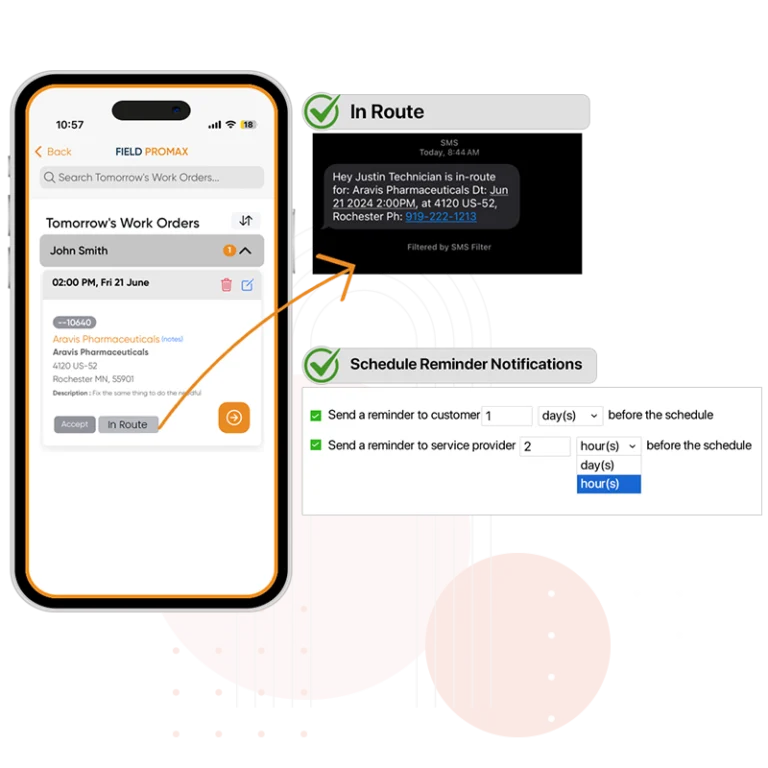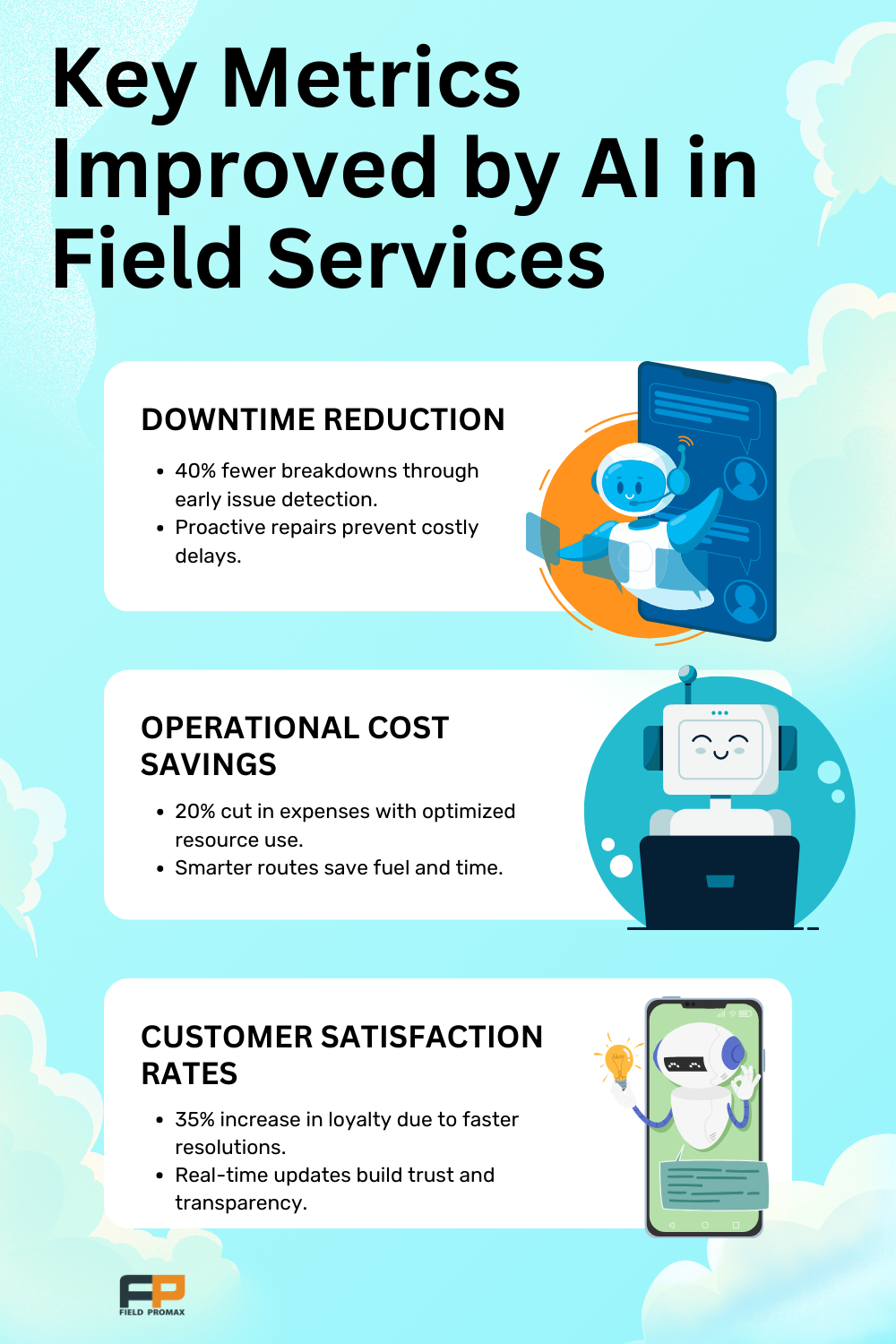AI in Field Services: A Complete Roadmap for 2025
By 2025, the AI market is expected to grow at an annual rate of 37.3%, reaching $126 billion globally. In field services, the adoption of AI can lead to a 30% reduction in operational costs and improve customer satisfaction rates significantly. Let’s explore how AI is reshaping the field services industry with practical insights and actionable tips.
What Exactly Is AI Doing in Field Services?
AI (Artificial Intelligence) is transforming field services by learning from data to make smarter decisions. Instead of manual guesswork, AI tools provide accurate predictions and actionable insights. Here’s what that looks like:
- Predictive Maintenance: Fix issues before they happen by identifying patterns in equipment performance.
- Optimized Routes: AI calculates the fastest and most fuel-efficient paths for your team.
- Improved Customer Communication: Real-time updates and AI chatbots keep customers informed and happy.

Fixing Things Before They Break
Imagine this: Your fleet of HVAC units is running across town. One unit shows unusual activity - AI detects the issue early and schedules maintenance. This avoids breakdowns, keeps clients satisfied, and reduces emergency repair costs. That’s the power of AI in action.
Other Day-to-Day Applications
- Inventory Management: AI tracks parts and supplies to prevent shortages.
- Employee Scheduling: Allocate resources more effectively based on job types and urgency.
- Dynamic Pricing Models: Adjust service charges based on demand and workload.
The Big Trends to Watch in 2025
AI is growing rapidly, and these key trends will redefine how field services operate:
Predictive Maintenance Everywhere
- The predictive maintenance market is growing by 25% annually.
- Businesses can proactively schedule repairs, saving time and money.
- Reducing downtime translates to increased customer loyalty.
Smarter Scheduling and Dispatch
- AI optimizes schedules considering traffic, weather, and job priorities.
- Save hours spent manually planning routes.
- Improves efficiency and reduces travel costs.
Enhanced Customer Communication
- Customers prefer updates in real-time - AI makes this seamless.
- Chatbots and automated messaging tools improve response times.
- Builds trust by keeping customers informed every step of the way.
Sustainability in Field Services
- AI helps reduce fuel consumption by optimizing routes.
- Promotes eco-friendly practices through better resource management.
- Supports long-term environmental goals while cutting costs.
Advanced Data Analytics
- AI-powered analytics offer deeper insights into business performance.
- Predict trends based on historical data, enabling better planning.
- Identify cost-saving opportunities and customer behavior patterns.
Practical Insights for Getting Started with AI
Thinking about using AI in your operations? Here’s how to begin:
Start Small
- Don’t overhaul your entire system at once.
- Choose one tool that solves a specific pain point - like a maintenance tracker.
- Gradually expand as you see results.
Train Your Team
- AI tools are only effective if your team knows how to use them.
- Conduct training sessions and provide guides for seamless onboarding.
- Encourage feedback to improve the adoption process.
Leverage Existing Tools
- Many AI tools integrate with your current software.
- For instance, Field Promax provides features like scheduling, dispatch, and customer management enhanced with AI capabilities.
- Integration ensures you get value without disrupting current workflows.
Measure and Adjust
- Regularly review how AI tools are performing.
- Gather feedback from your team and customers.
- Tweak processes to get the most out of your investment.
Focus on ROI
- Track cost savings and productivity improvements.
- Set clear goals to measure AI’s impact on your business.
- Use these metrics to justify further investments in AI.

What AI Can’t Do (Yet)
AI is impressive, but it’s not a magic solution. There are limitations:
- It won’t replace skilled technicians who understand the nuances of the job.
- It lacks the personal touch required to maintain strong customer relationships.
- AI supports your team but doesn’t replace their expertise.
The Human Element
A friend who runs a plumbing business shared this insight: “AI scheduling saves me hours each week, but I still personally call top clients. Relationships drive repeat business, not just tech.” Implementing AI Product Data Mapping streamlines the organization and categorization of vast amounts of product information. By automating data mapping processes, field service providers can ensure accurate and efficient access to product details, leading to quicker service times and reduced errors.
Preparing for 2025 and Beyond
AI is a tool that complements your expertise. If you’re ready to adapt, here’s how to prepare for the future:
- Stay Informed: Keep up with AI trends in your industry.
- Experiment: Test different tools to find what works best for your business.
- Focus on Service: Use AI to enhance - not replace - your customer interactions.
Long-Term Benefits
- Reduced operational costs with data-driven decisions.
- Improved employee satisfaction through streamlined processes.
- Higher customer retention due to proactive problem-solving.
- Enhanced sustainability practices contributing to a greener future.
Quick Recap
- Predictive maintenance can prevent costly breakdowns.
- Smarter scheduling saves time and fuel.
- AI improves communication without removing the human touch.
- Start small, train your team, and work with existing tools.
- Sustainability is an added bonus - cut costs while going green.
- Advanced analytics open doors to better planning and cost control.
By 2025, AI will be a standard tool in every field service professional’s toolkit. With tools like Field Promax, you can start small, see immediate benefits, and gradually embrace AI’s full potential.